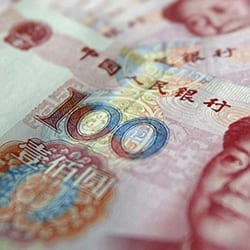The International Monetary Fund’s decision to include the Chinese currency in the special drawing rights (SDR) basket of currencies looks like a move with only upside. Essentially, the SDR basket is functionally meaningless except to convey prestige. Yet China must continue to liberalize in order to complete the inclusion process. Through this decision, the IMF signaled that it intends to accelerate and ease the Chinese yuan — or renminbi (RMB) — into the floating exchange rate system. Moving China in that direction will benefit the international economic system.
The SDR is a virtual currency, an accounting construct that reflects the value of IMF reserves, not a tangible currency. No one pays for anything with SDR. In order to be included in the SDR, the key criterion is whether or not the RMB is “freely usable” for international transactions and trade. In fact, the RMB surpassed the yen and became the world’s fourth most used currency in global payments in August 2015. Additionally, the RMB is used as a reserve currency by Chile, Thailand, Australia, South Africa and Nigeria. The IMF’s “Review of the Method of the Valuation of the SDR” shows that, moreover, the RMB is now exhibiting traits of a freely usable currency.
Some economists and politicians were eager to argue that the IMF should not adapt the RMB because of the People’s Bank of China’s (PBoC) currency intervention this summer. However, it would be difficult to support a view that the currency was manipulated. Rather than undervalue the RMB, the intervention would have caused it to be overvalued. Even the U.S. Treasury in its “Report to Congress on International Economics and Exchange Rate Policies” softened its view that the RMB is “significantly undervalued,” noting that the currency is merely “below its appropriate medium-term valuation.”
Regarding adopting the SDR, rather than consider manipulation, it will be useful to see how much Chinese authorities will be able to liberalize the financial system by opening up the country’s capital account and moving to a floating exchange system.
China has made efforts to mitigate restrictions on capital flows from other countries and introduce a more market-determined mechanism for the exchange rate. It needs to continue to open up its capital account for capital flows to move in and out freely, facilitating a change from a managed float to a floating exchange rate.
More importantly, China has to solve its shadow banking issues and debt.
Shadow banks are financial intermediaries outside of the regular banking system, such as hedge funds, money market funds and credit insurance providers. UBS, a Swiss bank, estimated that shadow banking assets in China amount to between US$4.6 trillion and $6.5 trillion (50 to 70 percent of GDP in 2013). This share is not especially larger than that of any other country, but integrating another shadow banking sector into the global financial system only adds to global risk.
In addition, China’s debt-to-GDP ratio expanded rapidly from 121 percent in 2000 to 282 percent in 2014. A McKinsey study indicated that the debt of many local governments is not likely to be sustainable. If adopting the SDR leads to greater integration of China into international capital markets, these two issues could become a trigger for systemic risk.
What will the role of the RMB be in the future? Because of the SDR’s status as a “symbolic currency,” the RMB’s inclusion in the SDR itself does not have the power to abruptly alter the RMB’s ascendancy. The RMB will not replace the U.S. dollar in its role as the international reserve currency, seeing that the dollar is so utterly dominant as the currency for international transactions. However, the RMB will continue to gradually assume greater prominence.
On the political side, by endorsing China’s economic ascent, the IMF earns China’s goodwill and support. This is good for the West and Japan, because the IMF represents their value system. There is some question of whether the RMB’s inclusion will lead to greater influence inside the IMF. Capitol Hill still has not approved the reform package that would give China greater voting power in the IMF, perhaps because it is not yet comfortable with China’s use of its emerging power. President Xi Jinping called for a “new form of great-power relationship,” but the U.S. exhibits little interest. For a while, voting rights will remain a topic for future discussion.
China cannot be content with the RMB’s new status, but instead must continue to liberalize the financial system. It must abolish financial regulations such as the fixed exchange rate and interest rate controls. This will level the playing field for China’s competitors. Perhaps more importantly, it should address its domestic financial vulnerabilities before it becomes a cross-border systemic issue. If the SDR inclusion nudges the country forward, we should all welcome the IMF adding the RMB to the SDR basket.
Masaaki Yoshimori is a contributing expert at the Baker Institute.
Russell A. Green is the Will Clayton Fellow for International Economics at the Baker Institute.
